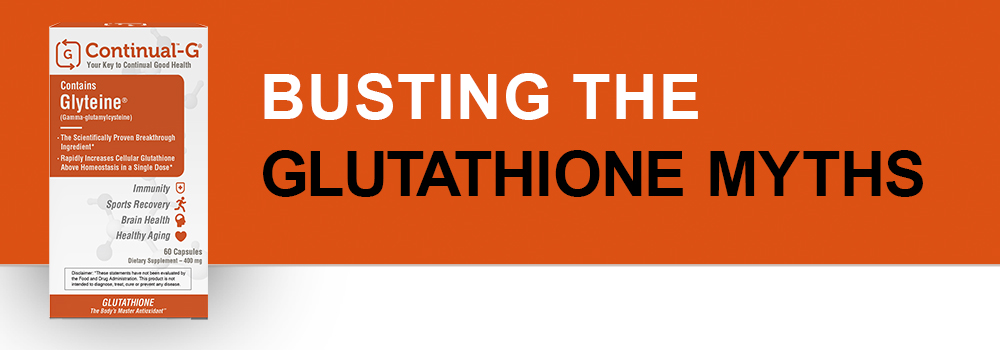There is much to be said about glutathione, which is commonly referred to by scientists as the master antioxidant. Each cell in your body is responsible for making and maintaining its own supply of glutathione, which they use to fight off free radicals and to recycle other key antioxidants such as Vitamin C. Free radicals are produced by our body’s cells during normal metabolism and can come from the environment through a poor diet or polluted air.
Without enough glutathione our cells will enter oxidative stress, which if not addressed can lead to cell damage, loss of physiological function and ultimately cell death. Glutathione depletion can be acute and extreme such as during paracetamol (acetaminophen) overdose.
Glutathione is composed of the three amino acids (protein building blocks); glutamic acid, cysteine, and glycine. Cysteine is what scientists refer to as the “limiting substrate” for glutathione synthesis, which means it is the first one of the three that your body runs out of when it is under heavy attack by free radicals. Without immediate treatment with n-acetylcysteine (NAC), which is a source of cysteine, overdose patients are at high risk of live failure and death. The NAC helps cells get back to normal glutathione production and hopefully before permanent and perhaps lethal damage occurs. Other sources of environmental free radicals that can deplete our glutathione reserves include smoke, drugs, alcohol, radiation, UV, heavy metals, extreme exercise, and poor diets.
In many health conditions and as we age, our cells progressively lose the capacity to make enough of glutathione’s immediate precursor gamma glutamylcysteine (Glyteine). Consequently, they cannot make enough glutathione to control the free radicals and prevent oxidative stress, which over time leads to accumulated cellular damage, which manifests as symptoms.
The entire premise of our supplements is based around addressing this shortfall in Glyteine production and allowing your cells an opportunity to recover from oxidative stress. Glyteine is the only supplement that has been clinically demonstrated to increase cellular glutathione levels after a single dose.
However, with so many different types of supplements marketed for replenishing your reserves of glutathione, it can be difficult to know the ins and outs, and what is factually correct and what isn’t.
With so much misleading information out there, we have put together a blog post that busts the glutathione myths so rest assured that you have the accurate facts for your health.
What is Glutathione?
Before we delve into the myths (and facts) of glutathione, we should begin by filling you in on what glutathione is.
As mentioned above, glutathione is known as the master antioxidant. And this is because it plays a crucial role in supporting your overall health and well-being, so that you can live like you mean it and feel your best every day.
Beyond just good health, having enough glutathione is essential for:
- Immunity
- Healthy living
- Sports recovery
- Brain health
In summary, glutathione is your body’s armour, ready to protect you from whatever may come its way. It is your body’s first line of defence against free radicals and helps support general wellbeing. But … if your cells are under attack from acute excess exposure to environmental free radicals or they have lost the capacity to make enough Glyteine and consequently glutathione then ill health is likely just around the corner.
Want to delve into what glutathione is even further? We have a full blog post dedicated to this topic here
Busting the Glutathione Myths
Now that we have covered the basics of what glutathione is, it is time to bust some of the many myths surrounding this antioxidant. We explore these below.
1. It doesn’t matter that most glutathione supplements break down before entering our cells.
False.
Remember in most health conditions, the cells in the affected tissue have lost the capacity to make enough of the immediate precursor gamma glutamylcysteine (Glyteine) and consequently glutathione.
When glutathione is taken as a supplement it cannot directly enter your cells. In fact, the majority of your cells are covered with an enzyme, gamma glutamyltransferase, that has the sole job to break down glutathione to its three component amino acids. These amino acids can then enter cells but once inside they cannot do anything to overcome that loss in capacity to make enough Glyteine.
Even though NAC can enter a cell, it is just a source of cysteine and also can do nothing to overcome the shortfall in Glyteine production. The only theoretical and clinically demonstrated way to increase glutathione levels in these health conditions is to supply what is missing, which is Glyteine.
Continual-G® is the only supplement on the market that contains Glyteine.
Don’t waste your time and money on other supplements like glutathione and NAC, as they simply cannot enter cells and increase their glutathione to more healthy levels!
2. Glutathione supplements can increase glutathione levels that are permanently depleted.
False.
Taking a glutathione supplement may increase the glutathione levels in your blood plasma (the liquid component), but as we have mentioned in the point above, it is inside your cells where it is really needed. This is because the concentration of glutathione inside cells, even when depleted, is so much higher than the concentration found in plasma - and as such cannot be passively taken up by cells (via osmosis).
Cells also do not have any energy requiring system (active) for taking up glutathione from plasma. Glutathione supplements are simply broken down by enzymes on the outside of cells with the resulting amino acids being able to enter cells, where they can be used to resynthesise the glutathione. But … this is of little use if you are suffering from a health condition or just simply getting older where your cells have lost the capacity to produce enough Glyteine to fuel the production of sufficient glutathione to fight off free radicals and oxidative stress. As we age and in many health conditions, glutathione homeostasis in our cells becomes dysfunctional. This means, they still make glutathione but do not maintain enough of it to protect them against oxidative stress.
Simply taking any glutathione-targeted supplement (without Glyteine) will not (and theoretically cannot) increase your cellular glutathione levels above homeostasis. And above homeostasis is what is needed if it has become dysfunctional.
3. Glyteine is needed to achieve an increase in your cellular glutathione levels.
True.
Unlike glutathione, Glyteine can readily and passively enter your cells and once inside, it is immediately converted to glutathione which then drives more Glyteine to enter the cell, leading to a progressive increase in glutathione above homeostatic levels.
To ensure your cells are regularly rescued from any oxidative stress, we recommend taking Continual-G® twice a day, morning and evening.
So, now that you have busted the common myths of glutathione you can shop Continual-G® here.
Disclaimer: The information on this website is not intended nor implied to be a substitute for professional medical advice. It is provided for educational purposes only. Always seek the advice of your physician or other qualified healthcare provider before starting any new treatment or discontinuing an existing treatment. Talk with your healthcare provider about any questions you may have regarding a medical condition.






